- Hey Dullblog Online Housekeeping Note - May 6, 2022
- Beatles in the 1970s: Melting and Crying - April 13, 2022
- The Beatles, “Let It Be,” and “Get Back”: “Trying to Deceive”? - October 22, 2021
The tireless George Starostin, still working his way through Rate Your Music’s list of “Top Albums of All Time,” has just published a new review of the White Album (currently #25 on the list). As usual, there’s plenty of substance in Starostin’s review, and I highly recommend it. These lines particularly stood out to me (ellipses mine):
“A typical ‘complaint’ against The Beatles is that this is the first album where the band, much too often, reads like the sum of its parts rather than a collective whole: The Lennon songs are Lennon, the McCartney songs are McCartney, the Harrison songs mark his complete transformation into an individualistic artist in his own rights, and even Ringo could make the sound of “Don’t Pass Me By” symbolic of his upcoming solo career. As true as it is, I think that, at least in the case of the White Album . . . this is a plus rather than a minus. On one hand, even at their most separatist-secessionist, there was still some sort of intuitive understanding of what could pass for a ‘Beatles song’ and what could not; and on the other hand, this is what helps make The Beatles the most sincere-sounding, straight-from-the-heart record of the band’s career up to that point.”
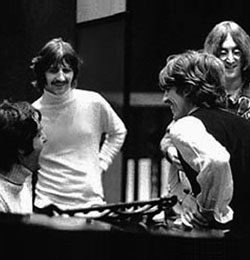
Not much tension evident in this shot of a White Album session
The claim that this is the most “sincere-sounding, straight from the heart record” the Beatles had made to this point makes sense to me, and I think it accounts for why many fans rank this close to or at the top of their list of favorite Beatles albums. Certainly there’s a sense of looseness and wildness to the proceedings, an atmosphere of “anything goes” that’s very different from the ramshackle feeling of Magical Mystery Tour.
I’m less enamored of Starostin’s decision to structure the rest of the review as lining up pairs of songs and asking who wins in the Lennon/McCartney “battle” — even his explicit statement that this is “as silly a topic for conversation as it is inescapably attractive” can’t redeem, for me, the tiredness of this framework. It’s not even that I disagree with him about the merits of most of the songs he writes about (though I must admit I can’t fathom prizing “Sexy Sadie” above “Blackbird”), it’s that writing about them in this “who wins” way obscures how much collaboration there actually is in this album. “Dear Prudence” needs that bass line, “Ob-la-di, Ob-la-da” needs that fierce piano intro, etc.
But once again Starostin has succeeded in making me think through my reactions to this album, and I’m reminded anew of how much I appreciate his overall fair-mindedness. The White Album is indeed “an album about nothing in particular, an album about everything and then some.” My attitude toward this album (and increasingly to life in general) is summed up by two lines from “Martha My Dear”: “When you find yourself in the thick of it / help yourself to a bit of what is all around you.”

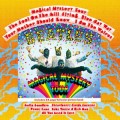
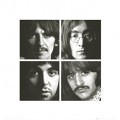
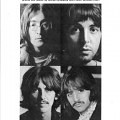

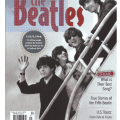
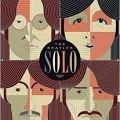
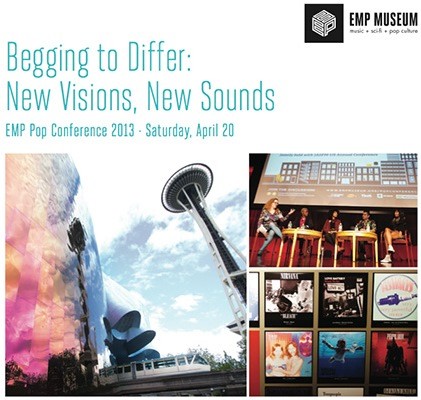

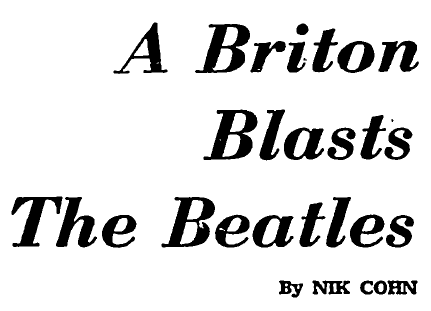
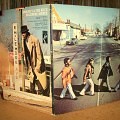
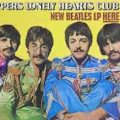
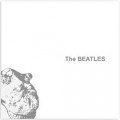
As music, the White Album is great. Mirabile dictu, less than two weeks ago, I was listening to it of my own free will, and enjoying it. The Beatles’ catalog would be immeasurably lesser if it did not exist.
But as a concept, it flies in the face of what made The Beatles great; it’s a conscious turning away from the “four-headed monster” ethos that created all their finest work. It is, in some sense, John/Paul/George/Ringo’s first solo album, and it’s their best because of the presence and assistance of the other three plus George Martin and Eric Clapton. To enjoy it is to enjoy something different from what had come before, and what would happen only one more time with Abbey Road. (Put the two on back to back sometime — less than a year apart, they are vastly, vastly different; whereas there is an undeniable kinship between Abbey Road and Pepper.)
The shift from MMT to White stems from Lennon’s fierce adherence to a new idea: the rock and roller not as pop craftsman, but as auteur. This fundamentally high art idea first leached into popular culture via film, thanks to critics like Francois Truffaut and Andrew Sarris; and by 1968 was the lifeblood of, for example, Rolling Stone. While it is a fascinating and worthwhile way to look at art and artists — and the license it provides has given birth to many amazing works of art — it rests on a sense, sometimes spoken, other times not, that the auteurist method of creation results in more authentic and sincere products than, say, the way MGM made movies in 1939 or the way the Beatles made “A Hard Day’s Night.” This is a far-from-proved intellectual conceit, not a fact, and the conceit works hand in glove with the necessity of a critical priesthood. Auteurist art needs a sensitive critic — Truffaut on Hitchcock, Rolling Stone on Lennon — to translate the work to the masses who may be all too likely to simply enjoy it.
By calling White the group’s “most sincere-sounding, straight-from-the-heart record,” Starostin is throwing his weight behind the auteurist idea — and why shouldn’t he? There’s a space for the critic in White (as there is in Pepper) that didn’t exist with MMT or Revolver, much less the Beatles’ earlier work. The auteurist theory works beautifully for the creator, and for the critic; both get what they crave. But it’s far from certain that auteurist methods are any better at creating Great Art.
For example: I love Federico Fellini almost as much as I love the Beatles, and to me, La Dolce Vita and 8 1/2 are as wonderful as any movie ever made. But last week I re-watched City of Women, and found it execrable. Without auteurist theory — movies marketed as the latest expression of a great artist’s personal vision, an entire movie studio at his disposal, and an intellectual framework that says it’s not only appropriate but essential that Fellini dump his undigested archetype-addled psyche onto the screen — City of Women would have been made to conform to basic elements of story structure, plot, and so forth that would’ve made it infinitely more watchable, and probably a lot more interesting too.
A belief in auteurism makes Starostin say silly things like the following:
“For another thing, even at the height of their experimentalism the Beatles never saw any serious need to expand beyond their qualifications as a “pop” band – the songs remained relatively short, largely retained the verse/chorus/bridge structure, avoided tricky time signatures and did not, in general, take on any unnecessary artistic risks that could be misunderstood by 90% of their huge fanbase, by which, to a certain extent, they were held hostages.”
…or, the ideas they wanted to express were best suited by the pop idiom, which they were fascinated by and masters of, rather than… what? Proto prog rock? The idea that John, Paul, George or Ringo were passive hostages to any aspect of their experience in mid-1968 is silly. They were masters of their situation, and at the height of their creative powers, and so unafraid of personal and artistic growth that they’d just fucked off to India for three months because they had met a groovy guy in Wales. Hostage to their fans? To the pop idiom? Not likely. More likely is, it was a choice — but that choice, by the auteurs themselves, has to be written out.
Inherent in the above is some sense that longer songs, exotically structured songs, and “tricky time signatures” are somehow the Great Undiscovered Country for the Beatles, as if they’d been Brubeck and Desmond ladling out pallid West Coast jazz until growing into “Blue Rondo a la Turk.” That complicated texts are somehow better texts — which they are, for critics. They aren’t, for popular artists. It is an idea of progress that hasn’t been borne out by any artistic movement, but is inevitably applied by critics at a certain point of cultural saturation. You see this idea of complexity and obscurantism as progress in writing (James Joyce), in jazz (popular forms like swing turn to be-bop and then to free jazz), and finally in rock, as virtuosic jam-bands like Cream parlay instrumental skill into supposed connection with audiences. But even Starostin must agree that — as with Ornette Coleman versus Charlie Parker or Duke Ellington — Cream and ilk are much less impactful to the larger society than The Beatles were, one’s a side tributary and the other is the Big Muddy. But as with Joyce or free jazz or brutalist architecture or or or, Cream needed a priesthood, and the Beatles did not.
And it’s the implicit idea of complexity as progress that makes Starostin say things like, “[1968 was the first year] the musical world could have politely said: ‘we don’t really need The Beatles any more – they already taught us all to swim, and now we can simply compete between ourselves.'” This is a nice idea that falls apart the moment you address it: who was writing popular rock at the Beatles’ level in 1968? Nobody. Nobody was writing songs like Hey Jude, and it’s absurd to suggest the rest of rock would have been sufficient without it. Listeners, and the art, needed the Beatles as much as ever, maybe more, to synthesize the diversity. But there is a group that really didn’t need the Beatles after Pepper, and that was critics.
Starostin’s review really comes apart when he says stuff like, “[White] is where individual Beatles openly cast off their walrus masks and emerge as humans, singing about themes that are genuinely important to them and expressing emotions that they genuinely felt at the time.”
Let’s see…off the top of my head: “Help!”, “Yesterday,” “Here, There, and Everywhere,” “She Said, She Said,” “Within You, Without You.” I mean, “Run For Your Life,” for God’s sake. What changes isn’t the content of the songs — it’s the self-consciousness. The Beatles were already masters at expressing themes that were genuinely important to them (“Think For Yourself,” “The Word”), and expressing emotions that they genuinely felt (“In My Life,” “Eleanor Rigby”). With White they suddenly become self-consciously “I”. They become defiantly individual, rather than effortlessly individual, and that’s a shrinking, not a growth — the application of auteurist vogue, nothing more. What is “Strawberry Fields Forever” or “Penny Lane” if not themes genuinely important to John and Paul, and emotions genuinely felt? Starostin is mistaking style for substance here, and he’s ‘way too smart for that. He’s right that White is a seminal text of the singer-songwriter movement — but that shows its retreat into modishness. To say something like the song “Help!” or “Yesterday” inspired a particular vogue is silly, because both of those tunes are much much bigger than that. It’s like comparing RAM to Revolver; and whereas RAM is wonderful but small enough to be touchable by critical opinion, Revolver (or Pepper or Rubber Soul or Abbey Road) is simply much too obviously genius to be impacted by any knucklehead with a keyboard).
White works not because it’s auteurist — it’s not particularly more sincere (“I’m So Tired” isn’t more “straight-from-the-heart” than “I’m Only Sleeping”) — but because it is the product of the only period of true rest and contemplation in the whole Beatles saga. If one listens to the Esher demos, one hears the spine of White — basically finished songs, which the group then recorded. Without the time to write, contemplation, communal living, and shelter from the distractions of money, women, and drugs, the Beatles proved to be unable to create under the auteurist conditions that were increasingly in vogue from 1967 on.
That’s really interesting, Mike. I wasn’t thinking of the auteur theory when I read Starostin’s review.
“They become defiantly individual, rather than effortlessly individual, and that’s a shrinking, not a growth” — I want to think about this some more. I wonder how much it was a change that they didn’t have much conscious control over. I see MMT as the last gasp of the kind of togetherness they had early on, and White as the point where that really broke down. As if, once they slowed down, they couldn’t hold it together any longer. Couldn’t, or wouldn’t? A question for the ages.
With Lennon, I think it’s pretty clear that it was an intentional, word-and-deed turning towards individual expression at the expense of the group ethos. With McCartney, I think it took him a year to realize that Lennon was serious, and was never again going to “do the little things” as he had earlier; and at that point, Paul stopped fighting it, and started work on McCartney.
This is all pretty well known; what is more interesting is how McCartney combined typical auteurist traits –fanatical attention to detail, ability to do all the things necessary, a wholistic imagining of songs and albums (even down to the packaging), but was fiercely committed to the group…until Lennon made the Beatles into “every man for himself.” That’s a rare combo, and for as long as it lasted, a huge advantage to the group.
“I’m less enamored of Starostin’s decision to structure the rest of the review as lining up pairs of songs and asking who wins in the Lennon/McCartney “battle” — even his explicit statement that this is “as silly a topic for conversation as it is inescapably attractive” can’t redeem, for me, the tiredness of this framework.”
Perhaps Starostin sees an “attraction” in viewing the album in such a framework, but that approach holds no appeal for me. At best, the endless pitting Lennon vs. McCartney is limiting, in that it keeps Beatles discussions and musical evaluations treading water rather than exploring new territory. At worst, it’s corrosive; as fans, musicologists, and biographers concretize the split, using it as means to praise one and bury the other. And ultimately, it fails to acknowledge the partnership and group alchemy that means that no song is purely a “John” or “Paul” creation, but a Beatles one.
“And ultimately, it fails to acknowledge the partnership and group alchemy that means that no song is purely a “John” or “Paul” creation, but a Beatles one.”
Yeah, and was there ever any group where the multiplicative factor was more important? To view the Beatles as John or Paul diminishes what the group was, and fundamentally distorts how it worked.
The Beatles “did not, in general, take on any unnecessary artistic risks that could be misunderstood by 90% of their huge fanbase”?
Well. I think they did that all the time! Just as an example, I don’t think I would’ve known what to make of the “Eleanor Rigby”/”Yellow Submarine” single had I been there when it came out. Or “Help!” – there really is no other song like it ever, is there? It’s SO unique, and it’s not even one of my absolute favourites…
Maybe I just don’t understand what Mr Starostin is getting at here.
An interesting side note on this album, which I would really like to find out more about, was that it was sequenced during a marathon 24-hour session by John and Paul, the other two Beatles being absent. This may have been the very last time the two of them worked in close collaboration on anything.
It’s also interesting how John always spoke highly of this album, while being dismissive of the albums that both preceded and followed it. This is no doubt because he was so well represented on the White Album, but had a relative paucity of material on MMT and LIB (looking at the lineup of MMT and LIB just now, I’m actually astonished at how little new material John had on offer in either of them).
That’s really interesting — I hadn’t heard that about the album being sequenced by just John and Paul. I’d like to know more about that too.
There are several instances where paul and john collaborated closely after this mixing session. Ballad of John and Yoko is a great example. Just the two of them in the studio for an entire day. https://en.wikipedia.org/wiki/The_Ballad_of_John_and_Yoko
This may have been the very last time the two of them worked in close collaboration on anything.
.
They worked together on the Ballad of John and Yoko. Ringo & George were out of town.